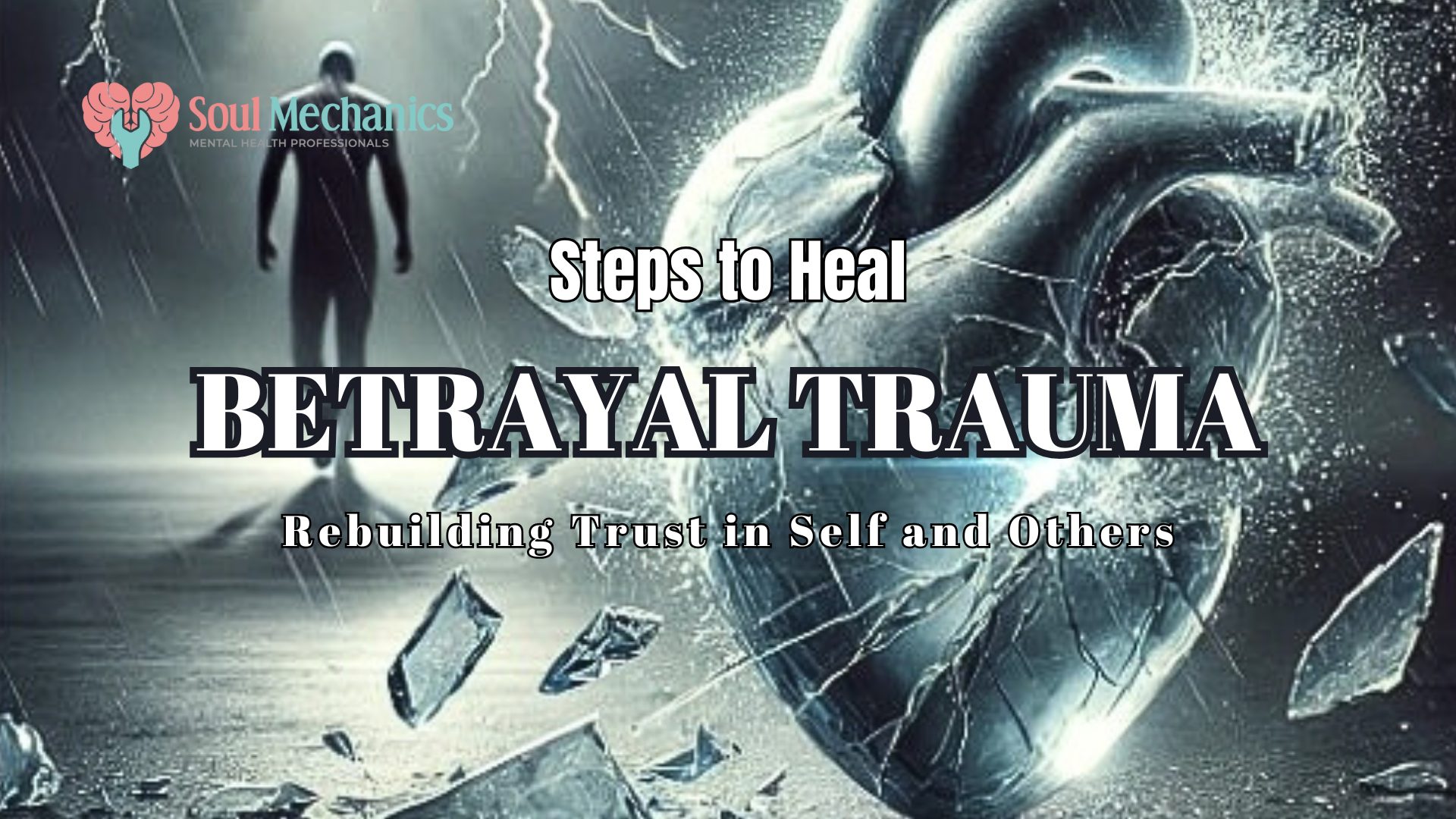Betrayal Trauma: When Loyalty Hurts
Betrayal Trauma: When Loyalty Hurts

Written By: Shaundtrya Ganasan, Licensed Counselor (KB11097)

Betrayal trauma hurts deeply, shattering your basement of safety and trust in your relationship with others and yourself. Be it in family bonds, friendships or romantic relationships, the emotional pain of betrayal can leave long-lasting wounds that impact your mental and physical health. Healing from betrayal trauma is a journey that is built through patience, compassion, reflection and often professional assistance.
In this article, let's explore the steps to heal your betrayal trauma. It is a journey of regaining a sense of self, fostering emotional resilience, and rebuilding trust with loved ones and yourself.
Reminder: If you or your loved ones are struggling with betrayal trauma or mental health issues, please don't hesitate to reach out to us at Soul Mechanics KD or Soul Mechanics Ipoh. Remember, seeking help is not a sign of weakness but strength!
Understanding Betrayal Trauma
Before we dive further into healing betrayal trauma, it is crucial to understand it. It is a trauma that happens when someone you trust deeply violates it. This involves dishonesty, infidelity, abandonment, or broken promises.

The pain from such experiences often roots from a deep sense of disconnection - not just from the betrayer but also from yourself. You may also question your intuition and ability to judge, feel that you don’t deserve love, or become hypervigilant in relationships. Betrayal trauma does not only affect your relationships but also how you perceive yourself and how you navigate the world.
Step 1: Acknowledge & Validate Your Emotions

Healing starts when you gradually begin to acknowledge the depth of your pain and distress. It is natural to go through overwhelming emotions like sadness, anger, confusion, helplessness, shame and even guilt. Oftentimes, we tend to suppress these emotions due to the fear of being judged or dismissed.
However, suppressing these feelings will only intensify your trauma. Instead, allow yourself to feel. Take it slow. Talk to a trusted loved one, journal or seek professional therapist assistance. These will help you to gradually process your emotions in a safe space.
“FEEL it to HEAL it”.
Reminder: If you or your loved ones are struggling with betrayal trauma or mental health issues, please don't hesitate to reach out to us at Soul Mechanics KD or Soul Mechanics Ipoh. Remember, seeking help is not a sign of weakness but strength!
Step 2: Reconnect with Your Body
Betrayal trauma is not only an emotional experience, but it can live in your body as well. Physical signs like insomnia, stomach discomfort, or feeling fatigued are the common symptoms of trauma.
Techniques to reconnect with your body:
Grounding exercises: Practices like walking barefoot on grass, deep breathing, or focusing on physical sensations can assist you in being in the present moment.
Movement: Dancing, yoga, or other types of movement can help you to release stored emotions and tension from your body. It will also re-establish the safety sense in your body.
Mindfulness: The practice of observing your emotions and feelings without any sense of judgement will navigate you to create a safe space for healing.

Step 3: Establish Boundaries
Betrayal often leaves you feeling exposed and vulnerable. Setting firm boundaries is an essential step to regain your safety and sense of control. These boundaries include:

- Limiting or stopping any contact with someone who betrayed your trust.
- Defining the behaviours that are acceptable and unacceptable (red flags) for your present and future relationships.
- Learning to prioritize your needs over external pressures.
Having or setting boundaries is not about being selfish or pushing others away - they are to protect your emotional well-being as well. Boundaries empower you to learn to take control of your healing journey.
Step 4: Challenge Self-Blame
One of the usual responses to betrayal trauma is self-blaming. As a victim, you may begin to replay the events of the betrayal, wondering how would have been if you had prevented the betrayal from happening or if you were “not enough” that they chose to betray your trust.

This step involves acknowledging that the betrayal experienced is the reflection of the other person’s choices. It doesn’t define your self-worth. Working with a professional therapist can navigate you to gradually untangle your unhealthy self-limiting thoughts and begin your healing journey.
Reminder: If you or your loved ones are struggling with betrayal trauma or mental health issues, please don't hesitate to reach out to us at Soul Mechanics KD or Soul Mechanics Ipoh. Remember, seeking help is not a sign of weakness but strength!
Step 5: Rediscover Your Identity
Betrayal trauma also disrupts your sense of self. It can make you feel helpless, lost, or even question your reality and identity without the relationship or trust you once had.
Here is how you can heal your core self:

Reassess your values: Reflect on what matters to you and let this reflection be your guide on future decisions.
Engage in self-care: Prioritize engaging in activities that help you to nurture and heal your mind, body and soul. It could be as simple as having a long shower, making a cup of coffee, spending time in nature or indulging yourself through creative outlets.
Explore your passions: Engage in interests or hobbies that can reignite your joy and remind you of who you are and your strengths.
Step 6: Seek Professional Support
Healing from betrayal trauma oftentimes needs further assistance from a professional mental health therapist. A professional trained in trauma healing can guide you to heal with effective strategies to process your trauma and rebuild your sense of trust.
Below is how therapy can be beneficial:
- Provides you with a safe space to process your pain, triggers, and emotions due to the trauma experienced.
- Navigates you to challenge unhealthy thought patterns and build healthier and more effective coping strategies.
- Focuses on your mind and body association to release stored and unprocessed trauma.

Remember, healing from betrayal trauma can be a tough journey and you don’t have to walk through it alone. Seeking help is never a weakness but a sign of your courage to heal.
Step 7: Rebuild Trust
One of the tough aspects of healing this trauma is to trust again. Remember, trust does not have to start with others but yourself.
How to rebuild self-trust:

Honour your intuition: Give attention to your gut feelings and learn to reflect and differentiate between your intuition and fear.
Keep promises to yourself: Set small, realistic, achievable goals and follow through.
Celebrate your progress: Acknowledge the small wins and milestones you achieve throughout your healing journey.
Trusting yourself cultivates a healthier relationship foundation with others and yourself.
Reminder: If you or your loved ones are struggling with betrayal trauma or mental health issues, please don't hesitate to reach out to us at Soul Mechanics KD or Soul Mechanics Ipoh. Remember, seeking help is not a sign of weakness but strength!
Step 8: Foster Healthy Relationships
As you begin to heal, it is common to feel hesitant to form new connections with others. Follow your pace and take your time. It is important to surround yourself with people who respect your boundaries and limits, validate your emotions and show trustworthiness.
Signs of healthy relationships:
- Consistent efforts and actions.
- Open and transparent communication.
- Mutual respect and empathy.

Let these connections be a reminder that not everyone betrays and that love and trust are still possible to be embraced.
Step 9: Embrace Forgiveness (ONLY When You’re READY
Forgiveness is a very personal choice and process, it does not mean you are forgetting or excusing the betrayal. Instead, you are freeing yourself from the burden of anger, pain, and resentment.

Forgiveness involves:
- Releasing the desire to seek revenge.
- Letting go of the need for closure, explanation or apology.
- Choosing peace over the bitterness lingering within.
Reminder: Forgiveness is not a MUST requirement to heal, but for many, it can be a very POWERFUL step towards closure.
Step 10: Commit to Ongoing Healing
Healing from betrayal trauma isn’t easy or a linear process. There will be days where it will hit you hard, and there will be good days. What matters here is your commitment towards healing, personal growth and self-compassion.

As you continue through your healing journey, it is important to remember that you are more than your trauma. The pain of betrayal or the betrayer does not define who you are. It is your resilience and ability to bounce back with love that defines you.
Conclusion

Healing from betrayal trauma is a significant journey towards rediscovering yourself and defining your values. It is a journey of reclaiming lost power, learning to trust yourself again, and creating a life with genuine connections and authenticity.
Although the road can be tough, remember that you don’t have to walk through it all alone. Seek support from trusted loved ones or professionals, practice self-compassion, and have trust in your capacity to heal. With time along with conscious efforts and patience, you can bounce back wiser and more connected to your authentic self than ever before.
“Trust is like a glass, but not everyone breaks it. Some help you to heal it. Allow deserving ones to experience genuine connection”
Shaundtrya Ganasan, Licensed Counselor (KB11097)
If you’re looking for a therapist in Kota Damansara or Ipoh area, you can click here for more information.
If you enjoyed reading this, why not broaden the horizon of knowledge by learning about "Sexual Trauma: Dissociation & the Body"? You can read the blog here.
For more content related to mental health do follow us on our official Instagram.

